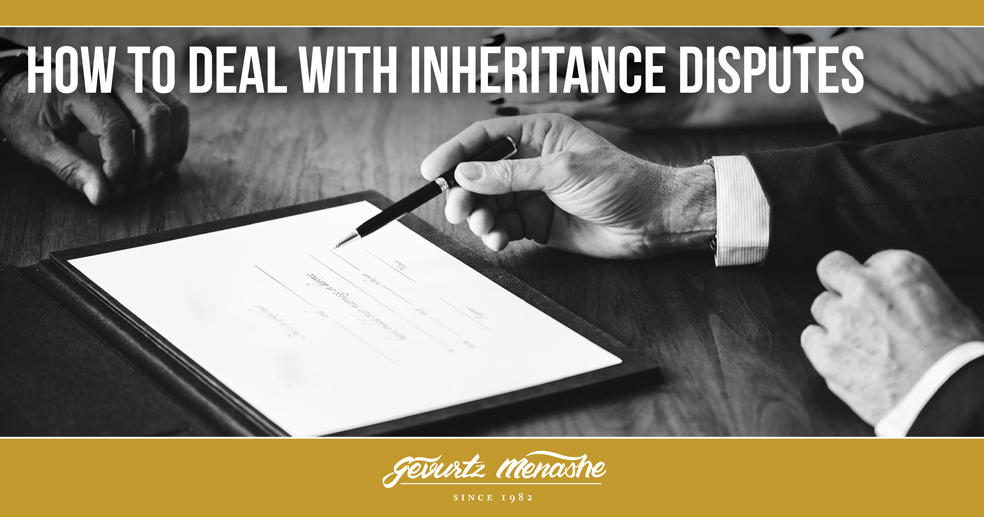How to Avoid Inheritance Disputes

Inheritance disputes can be stressful to deal with, especially when they put a strain on familial relationships during an already difficult time.
The best way to avoid these disputes is by working with an attorney who specializes in estate planning and family law. In this post, we’ll talk about the best methods for avoiding potential issues related to inheritances and resolving inheritance disputes when they arise. We’ll also cover what to do when disputes arise because a loved one passed away with no Will or trust.
Wills, Trusts, and Other Estate Planning Options
A clear and comprehensive estate plan is typically the best and easiest way to prevent inheritance disputes. If you’re concerned that disputes may arise regarding your own estate, a good attorney can help you explore and choose amongst the best options available to you. A Will or revocable trust are the most common tools for determining who will receive your assets upon your death, although there are many other options at your disposal as well.
On the other hand, if you have been named trustee or executor in a loved one’s estate plan, you may be faced with navigating inheritance disputes during the process of administering the estate. This process can be extremely complex legally, financially, and emotionally. It can be difficult when family members disagree about how an estate should be handled. The best way to avoid or settle inheritance disputes in this case is to work with an attorney who has extensive knowledge of probate, estate administration, and trust administration laws in your state.
Solving Inheritance Disputes with Relationship Agreements
Disputes can also happen between couples. Relationship agreements are becoming more and more popular as a way for one or both people to maintain control over their assets and to avoid confusion that can arise when the parties do not clearly communicate about their intentions with respect to inherited funds.
Relationship agreements are often used in conjunction with estate planning documents in order to protect inheritance and define what will and will not be divided when the partnership ends—either by death or divorce.
Different types of relationship agreements exist to suit different circumstances, including:
- Prenuptial Agreements — a financial contract that a couple agrees upon before getting married
- Domestic Partnership Agreements — a similar contract used by people who want to clearly define an agreement with respect to finances, but do not intend to marry or who plan to register a civil union with the state
- Postnuptial Agreements — an agreement that a couple negotiates and signs after marriage
It’s important to note that, while all these types of agreements are clearly enforceable in the State of Washington, things are a little more complicated in Oregon. Premarital Agreements are recognized in Oregon by statute. Postnuptial agreements, on the other hand, are not authorized by statute in Oregon, and the enforceability of postnuptial agreements has not been fully addressed by Oregon courts. For this reason, it’s important to work with a skilled attorney if you’re considering a postnuptial agreement in Oregon.
Who Inherits When There Is No Will or Trust?
It’s extremely common for inheritance disputes to arise after a person has died and their loved ones are attempting to settle the estate. This can happen for many different reasons. For example, it could be that:
- The executor is not accurately following instructions in the Will or trust
- One or more people feel that the contents of the Will or trust are unfair
- The deceased person never wrote a Will or trust, or their wishes are not clear
Let’s explore in a little more detail what to do when there is no Will or Trust. When this happens, it means the person has died “intestate.” In this case, assets will be distributed according to the state’s intestate succession laws. Each state has its own laws that dictate what happens to property after a person dies intestate. If you are in this situation, it’s important to work with a local attorney who understands your state’s specific laws.
Furthermore, when there is no Will or Trust, state law determine who is eligible to administer the Will or Trust. Typically, a surviving spouse or registered domestic partner has priority as the first choice, followed by adult children, and then other family members.
The Emotional Side of Inheritance Disputes
We’ve seen first-hand how difficult inheritance disputes can be. In many cases, people’s relationships, support systems, and financial futures are suddenly uncertain, and this can be extremely stressful.
As attorneys, we specialize in helping our clients find the best possible legal and financial solutions in inheritance disputes. We understand that part of being great attorneys is the ability to recognize and respect the personal and emotional impact these disputes have on the people we work with.
Looking for Legal Advice?
Working with an experienced, dedicated attorney can make a huge difference in the outcome of your case. Whether you are hoping to prevent potential conflict in the future or you are currently in the middle of a contentious inheritance dispute, the attorneys at Gevurtz Menashe can help. We specialize in both estate planning and relationship agreements in Oregon and Washington. To talk about your options, call our Portland offices at 503-227-1515, our Vancouver offices at 360-823-0410, or contact us online anytime.
